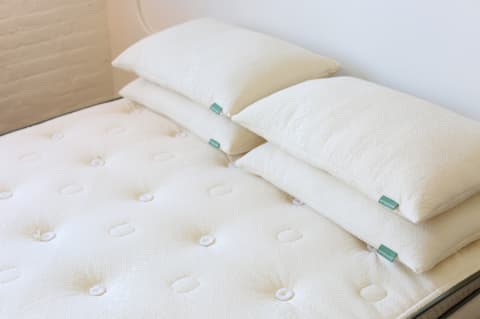Advertisement
The Problem With Online Shopping That We Really Have To Talk About

Too often these days, the more convenient choice is the less eco-friendly one. Case in point: ordering online.
When pretty much anything you could possibly need can be delivered to your door—sometimes as soon as the very same day—it’s tempting to deem errands a thing of the past and do all of your purchasing from the comfort of your own home. We’ve all been there: A recent survey found that 96 percent of American adults have bought something online at one point or another.
From a physiological standpoint, humans get an instantly gratifying dopamine hit when we buy stuff (in fact, our brains are wired to amass more things because, ancestrally, it helped ensure survival). And with online shopping, the powerful feeling of delayed gratification when the purchase arrives is so rewarding, it’s no surprise that online spending keeps going up every single year. By some estimates, we could be shelling out up to $4.5 trillion globally by 2021 on online purchases alone. So it’s critical to consider the bigger impact of online shopping and the part we as consumers play in it.
By some estimates, we could be shelling out up to $4.5 trillion globally by 2021 on online purchases alone.
What’s so bad about ordering online?
Thanks to a perfect storm of reward and convenience, Americans are buying and accumulating more things. And these aren’t necessarily higher-quality things, either, which means that we’re also replacing items more frequently. According to the Environmental Protection Agency1 (EPA), we’re tossing out more plastics (34.5 million tons in 20152) and textiles than ever before.
Take the apparel industry: Fashion can have up to six seasons in a year, and the average American bought 66 garments in 2017, based on figures by the American Apparel and Footwear Association. Online shopping with free shipping and returns encourages customers to load up their carts to try on different sizes and feel the materials at home, then return whatever doesn’t work—a cycle that leads to lots of wasted product. All of this consumption and waste contributes to greenhouse gas emissions and climate change.
And the effects of all this shipping takes a toll on our environment as well. In 2016, the EPA3 announced that transportation was officially the largest producer of carbon dioxide emissions in America, having overtaken power plants for this top slot. And nearly a quarter of the transportation industry’s CO2, a leading contributor to global warming, comes from industrial shipping. It’s a harsh reality, but the good news is that there are actionable solutions we can take
Buying for the long haul is one of the top ways to reduce your impact on the planet, so this is huge.
Convenience with a conscience
Making considered decisions about our product purchases is a good place to start. To help resist the urge to constantly buy more things and practice more mindful shopping, consider the whole life of the product—from its beginning to what will happen when you’re done with it. Here are a few good questions to ask:
- Do I really need or want this?
- Can something I already have do the same thing?
- How well made is this? Is it designed to last as long as I need it?
- If it’s only needed for a one-time use, can I borrow it from someone instead? Is there a less wasteful option?
- Where will it go when I am done with this? Can I recycle or donate it? Is there a safe and responsible way to retire it?
Secondly, seek out and support companies that are committed to more sustainable business practices. Let’s dive into one of the fastest-growing industries, direct-to-consumer mattresses, to see what those look like.

One thing that’s great about the direct-to-consumer model is that when companies cut out the middle man, they immediately and clearly see how much product they need to make. Avocado Green Mattress is one company that’s really taking advantage of this flexibility, and they only make their top-rated natural mattresses—using 100% natural latex rubber, natural wool, and certified organic cotton to boot—when an order is placed. In other words, there aren’t stacks of mattresses sitting around in warehouses waiting to be purchased. And because they own their own factory in Los Angeles, they can oversee every aspect of the production process.
Once the mattress is ready to go, Avocado Green ships the mattress straight to its new home in recycled cardboard boxes. Thanks to a partnership with CarbonFund, the company is all-in on carbon-neutral shipping, which really is as great as it sounds. Of course, it’s not currently possible to eliminate emissions from shipping entirely. (Fun fact: Future-facing companies such as Tesla are working on creating electric cargo trucks, but they’ll be expensive.) But Avocado Green can offset its calculated carbon footprint—specifically the emissions for their entire L.A. factory and national product shipments to people’s homes—by removing an equal amount of carbon dioxide from the atmosphere through CarbonFund’s reforestation and forest preservation programs.
The 5.5 million commercial trucks on the road run on quite a bit of gasoline, so it’s important that companies invest in projects that actually remove carbon from the atmosphere.
As it stands now, most of the 5.5 million commercial trucks on the road these days run on quite a bit of gasoline, so it’s important that companies invest in projects that actually remove carbon from the atmosphere. In Avocado Green’s case, that means reforesting the Mississippi Valley and adding more renewable energy farms in Massachusetts. The company is also members of 1% for the Planet, meaning they give back 1 percent of all revenues to environmental non-profits.
The environmental benefits don’t even end there: The mattress itself is guaranteed to last 25 years compared to 8-10 for a typical mattress. Buying for the long haul is one of the top ways to reduce your impact on the planet, so this is huge. And when you think about it, every purchase you make online or in real life is a vote for cleaner and more sustainable practices. Do the research, find out which brands and companies are being kinder to our planet, invest in them, and the cumulative effect can bring us closer to our goal of a healthier Earth. (The good news is that it’s not just companies getting on board: States like California and even entire countries are committing to going completely carbon-neutral in the next few decades.)
At the end of the day, this is just one example that mindful shopping doesn’t have to come at a high environmental cost. It’s all about being conscious of how your products are getting to you.
